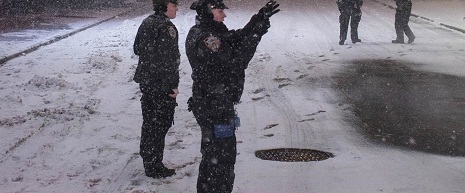"You don`t have people out and about in normal activity," said Brian Cheek, a deputy chief in Greensboro, North Carolina, where calls for larcenies, shoplifting, assaults, and domestic disputes have plummeted in recent days. "If people aren`t out, they won`t be potential victims for criminals to choose from."
The premise makes sense, anecdotally. It also has been repeatedly tested by researchers, who`ve come to similar conclusions.
"The general pattern is that extreme weather tends to cause an across-the-board decrease in crime when it`s cold," said Matthew Ranson, an economist for the Cambridge, Massachusetts, consulting firm Abt Associates. He recently published results of a study in which he combined 30 years of data across the country and found "a very strong historical relationship between temperature and crime."
Ranson, like many other researchers in this field, was driven by a desire to understand what the world will look like as global temperatures rise. They`ve all found good reason to believe crime, and social disorder, could increase. But at the same time, they`ve found evidence of the opposite: colder periods in recent and distant history correspond to drop-offs in criminal behavior.
Ranson examined nine major crime categories, from murder to theft, and found that offense rates decreased when the temperature dropped below about 50 degrees. In most cases, the rate continued to decline as the temperature got colder. The exception was car theft, which jumped when temperatures dropped below 10 degrees. Ranson believes that might be explained by an uptick in car owners leaving their vehicles running with the heat on.
The pattern Ranson found defied changes in climate — it remained true in places that were accustomed to frigid weather, and in places where it was rare. Ranson said he analyzed data in four different regions of the country, and determined that relatively cold weather corresponded to a decrease in crime. "What the research shows is that regardless of where you live, crime goes down when the weather is unusually cold," Ranson said.
He and other researchers stress that weather is just one of myriad factors that influences the crime rate: police strategies, economics, demographic and cultural shifts, even, according more recent lines of research, the prevalence of abortion and children`s exposure to lead.
But there`s little doubt that the weather plays a significant impact.
"Any police officer knows there`s more crime in the summertime than there is in the winter time," said Garry McCarthy, the superintendent of police in Chicago.
Chicago crime data clearly show crime hitting annual lows in winter months and peaking in summer months.
McCarthy has a more nuanced view, which also takes into account how people`s behavior changes at different times of the year. He pointed out that in the summer, kids are out of school while adults, including police officers, are more likely to be off work. Those circumstances don`t arise as often in the winter. "People confuse the weather with the seasons," McCarthy said. "There`s a difference."
McCarthy, who previously served as police director in Newark, New Jersey and as a deputy commissioner in the New York Police Department, where he ran the division that analyzed crime patterns, cautioned against applying any hard-and-fast rules. He`s seen robbery sprees during downpours, shooting spikes during blizzards, and crime lulls on sunny, pleasant days. The crime rate in Chicago so far this year, he said, is the same as it was this time last year, despite a much longer cold spell in 2014.
That is why he doesn`t pay too close attention to the studies. And he doesn`t spend too much energy worrying about the weather.
"The weather is an influence on crime," McCarthy said. "But it doesn`t cause, nor does it prevent, crime."
More about:
















































